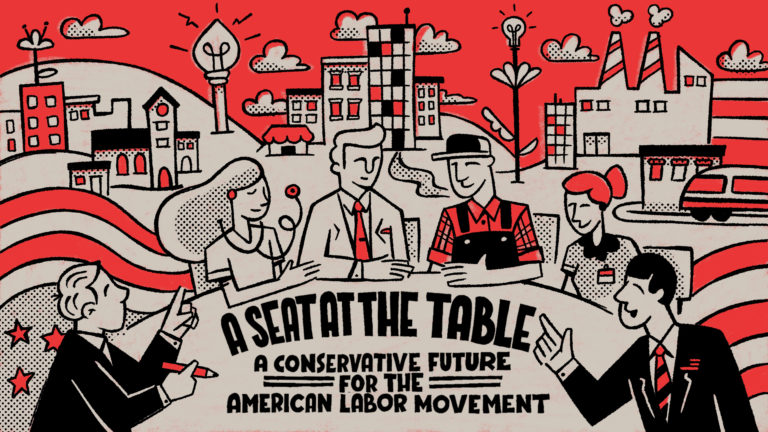Labor
Guaranteeing workers a seat at the table
Overview
The American labor movement has become deeply dysfunctional. Workers feel largely alienated from Big Labor unions, which appear focused primarily on promoting progressive politics. At 6%, the union membership rate among private-sector workers is lower than at the time of the National Labor Relations Act’s passage in 1935. That law not only fails to serve modern workers effectively, but also precludes experimentation with alternative forms of organizing.
What a tragedy. In a well-functioning capitalist system, participants meet as equals able to advance their interests through mutually beneficial relationships. Organized labor has traditionally been the mechanism that gives workers an institution of solidarity, power in the market, and representation in the workplace. Strong worker representation can make America stronger.
This has traditionally been the view of both free-market champions and social conservatives. Adam Smith warned in The Wealth of Nations that in the competition between capital and labor, employers have “the advantage in the dispute” over wage levels “and force [workers] into a compliance with their terms.” John Stuart Mill, analyzing this same conflict in Thornton on Labour and Its Claims, denounced the morals of “whoever does not wish that the labourers may prevail, and that the highest limit, whatever it be, may be attained.” In The Quest for Community, Robert Nisbet calls unions “the true supports of economic freedom,” while in The Spirit of Democratic Capitalism, Michael Novak identifies them as one of democratic capitalism’s “chief social inventions.” In the encyclical Laborem Exercens, St. John Paul II called them “an indispensable element of social life, especially in modern industrialized societies.”
At American Compass, we work to understand what workers want from their labor organizations and how the nation’s labor movement and labor law are falling short. We develop policy reforms that would allow workers to create and access new and better options.
The Seat at the Table collection makes the case for reforming and revitalizing American labor, beginning with a landmark joint statement arguing that Conservatives Should Ensure Workers a Seat at the Table. A Wall Street Journal essay, America Needs a Conservative Labor Movement, traces the history of conservative attitudes toward labor to identify the foundation on which a new movement could be built. Workers of the World surveys the wide variety of labor laws and organizations present in other countries.
The Better Bargain collection focuses on solutions, beginning with a survey of American workers that studies their experiences in the workplace, their attitudes toward organized labor in its current form, and the elements of collective representation that they would value most. Policy papers then offer concrete bargains that would require concessions from both existing unions and the business lobby, for the benefit of workers themselves: better bargains on Workplace Voice and Representation, Worker Power in the Labor Market, and Worker Solidarity and Mutual Support. The first of these has been adapted as the TEAM Act introduced by Senator Marco Rubio and Congressman Jim Banks.
Start Here

Conservatives Should Ensure Workers a Seat at the Table
Statement on a conservative future for the American labor movement.
Compass Advisors













